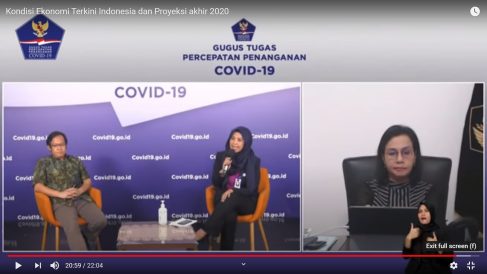Sri Mulyani and Vid Adrison: Indonesia’s Latest Economic Condition and End of 2020 Projection
Hana Fajria – FEB UI Public Relations Officer
Jakarta, 29/06/2020 – The Public Communication Team of the National Task Force for the Acceleration of Covid-19 Handling held a press conference at the Graha BNBP office. The event was broadcast live via TV and radio pools, featuring Minister of Finance Sri Mulyani Indrawati, Vid Adrison, Head of the Department of Economics, Faculty of Economics and Business, UI, and presenter Rizky Ika Syafitri.
A number of developed countries are expected to experience contractions in economic growth. Indonesia’s economy, as in the case of other economies, is under tremendous pressure due to the Covid-19 pandemic. The Minister of Finance said that Indonesia’s economy is still better than other countries although economic growth in the second quarter of 2020 was predicted to be minus 3.8%.
“Estimates for the US are negative, at close to 10%, the UK at minus 15%, Germany contracting by 11%, France minus up to 17%, Japan minus 8%. In fact, India, which has so far posted high growth, could contract by up to 12%,” said Sri Mulyani.
“This is a challenge for all of us, that Indonesia will be affected. We are taking various steps to prevent Covid-19, which affected the economy in the second quarter of 2020. Our estimate (of economic growth) was minus 3.8%. Imagine the situation the developed countries is in,” she added.
Sri Mulyani said the prediction that Indonesia’s economic growth would be minus 3.8 percent in the second quarter of 2020 was based on the calculation of a number of indicators. However, economic growth realization in the second quarter of 2020 could only be seen after that period ends. “Of course, we will see when the BPS (Statistics Indonesia) announces second quarter figures in August,” Sri Mulyani explained.
Sri Mulyani went on to say that the micro, small and medium enterprises (UMKM) sector and the informal sector, which are the pillars of Indonesia’s economy, are feeling the impact of the pandemic due to limited physical interactions. In estimating the impact of the pandemic on Indonesia’s economy, there are three things that need to be considered, namely disrupted public consumption, hampered investment, and contracted exports and imports.
“The government’s response to Covid-19 focuses on the health issue, which has since developed into social, economic and financial (problems),” she said on the impact of budget allcoation for Covid-19 handling on Indonesia’s economy.
Lastly, Sri Mulyani called on the public to adhere to health protocols while doing physical activity so that Indonesia’s public health and economy could recover. “If Indonesians want to remain productive, to continue their activities to support public health and the economy, then God willing, together we can do it,” Sri Mulyani concluded.
Vid Adrison said that national economic growth was relatively good. However, amid the Covid-19 pandemic, it is hard to gauge Indonesia’s economic readiness to face the challenges in the third quarter and fourth quarters.
To revive the economy, Vid said at least three things must be considered. “First, how long the Covid-19 outbreak will last and when can we stop it. Second, the size of population that depends on physical activity for their livelihood. Third, the effectiveness of government policies,” said Vid.
“Some can switch from offline to online. However, some still need physical presence. For those whose activities are highly dependent on physical presence, it is very important to comply with health protocols,” he said regarding the need for economic players to adapt during the pandemic.
Vid said that compliance with health protocols is one of the requirements to ensure that economic players can continue to drive Indonesia’s economy. “Follow health protocols so that we can break the chain of Covid-19 infections faster,” he said. (hjtp)
(lem)




